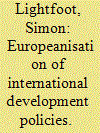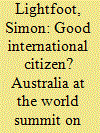| Srl | Item |
| 1 |
ID:
155424


|
|
|
|
|
| Summary/Abstract |
In this article we explore the implications of Brexit for the UK and the EU's development policies and strategic directions, focusing on the former. While it is likely that the operational process of disentangling the UK from the various development institutions of the EU will be relatively straightforward, the choices that lie ahead about whether and how to cooperate thereafter are more complex. Aid and development policy touches on a wide range of interests—security, trade, climate change, migration, gender rights, and so on. We argue that Brexit will accelerate existing trends within UK development policy, notably towards the growing priority of private sector-led economic growth strategies and blended finance tools. There are strong signals that UK aid will be cut, as successive secretaries of state appear unable to persuade a substantial section of the public and media that UK aid and development policy serves UK interests in a variety of ways.
|
|
|
|
|
|
|
|
|
|
|
|
|
|
|
|
| 2 |
ID:
093723


|
|
|
|
|
| Publication |
2010.
|
| Summary/Abstract |
This article examines the EU's role in the emergence of international development policy in the 10 member states from Central and Eastern Europe (CEE). Development policy provides useful insights into policy making as it is a key way that states operationalise their foreign policy. Thus, development policy gives us insights into the foreign policy priorities of the new member states. This article reviews the emergence and elaboration of policy relating to international development in the new member states and explores how far we have witnessed the Europeanisation of development cooperation in CEE states.
|
|
|
|
|
|
|
|
|
|
|
|
|
|
|
|
| 3 |
ID:
073367


|
|
|
|
|
| Publication |
2006.
|
| Summary/Abstract |
Australia has often been identified as a middle power in foreign policy terms. This article assesses the worth of the concept in understanding the role of Australia in global environmental governance. Using a case study of the role played at the World Summit on Sustainable Development, it assesses whether Australia conformed to a classic middle power role, building coalitions as a 'good international citizen' or whether its role was more like a veto state, preventing positive change. This is done via a reflection of Australia's Summit priorities and an assessment of its impact over the Summit outcomes. The article shows that Australia was able to offer leadership in certain specific areas, but overall domestic policy preferences, a growing mistrust of multilateralism, and a strong defence of the national interest meant that Australia played the role of a veto state, often in coalition with the United States of America.
|
|
|
|
|
|
|
|
|
|
|
|
|
|
|
|
| 4 |
ID:
102685


|
|
|
| 5 |
ID:
099749


|
|
|
|
|
| Publication |
2010.
|
| Summary/Abstract |
The election of the Labor government in 2007 appeared to usher in a new era of EU-Australian relations with a greater focus on those areas of agreement between Australia and the EU. This paper therefore explores the potential for closer cooperation between the EU and Australia in the area of sustainable development. It takes climate change as a 'litmus test' for the EU-Australia relationship due to the prominence given to the issue by both the EU and Australia and the contentious nature of the issue in relations between the EU and Australia under the previous government. After outlining the major tenets of the 'new era' under the Rudd government, those areas of policy divergence and convergence and thus opportunities for closer cooperation are highlighted and the residual issues that could offer opportunities for closer cooperation. It is concluded that these residual issues hinder developments in the relationship, but more signs of a new relationship are seen than previously.
|
|
|
|
|
|
|
|
|
|
|
|
|
|
|
|
| 6 |
ID:
111663


|
|
|
|
|
| Publication |
2012.
|
| Summary/Abstract |
The decision of the Conservative-dominated coalition to ring-fence international development spending has been, given the economic environment, one of most intriguing decisions of the new government. Recognising the relative neglect of academic work on Conservative policy towards international development, the article seeks to provide an explanation for its new-found prioritisation. In doing so, the article suggests that it can be attributed to four possible influences: that it can be tied to the process of modernisation and brand decontamination of the Conservatives; that it is a consequence of the personal commitment of key elites such as David Cameron, George Osborne and Andrew Mitchell; that it is by-product of the perceived success of the Department for International Development under New Labour, which made subsuming it within the Foreign and Commonwealth Office a non-viable (and expensive) option; and that protecting the international aid budget was actually in the British national interest.
|
|
|
|
|
|
|
|
|
|
|
|
|
|
|
|